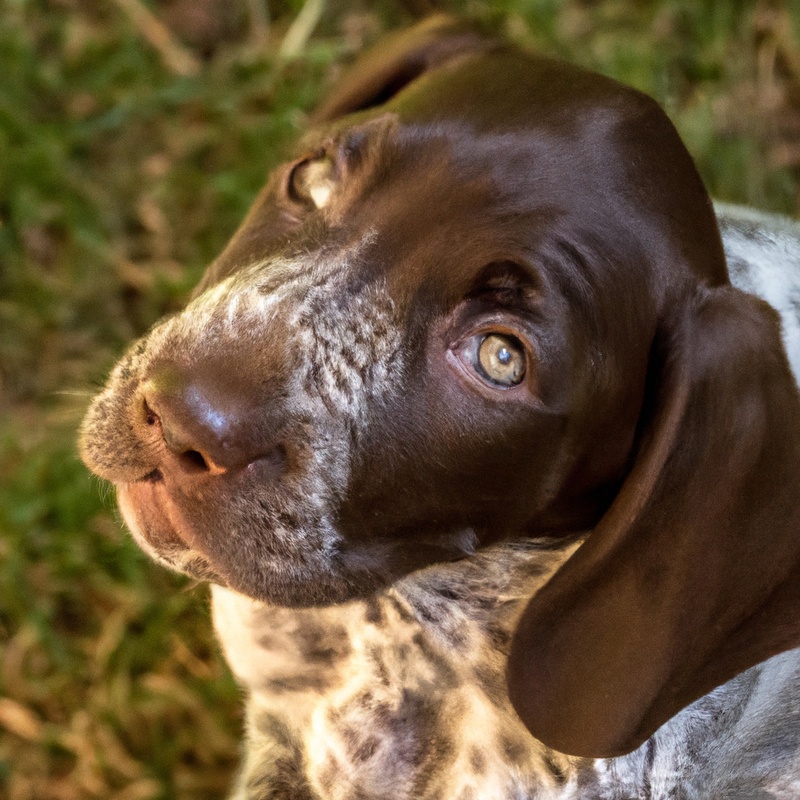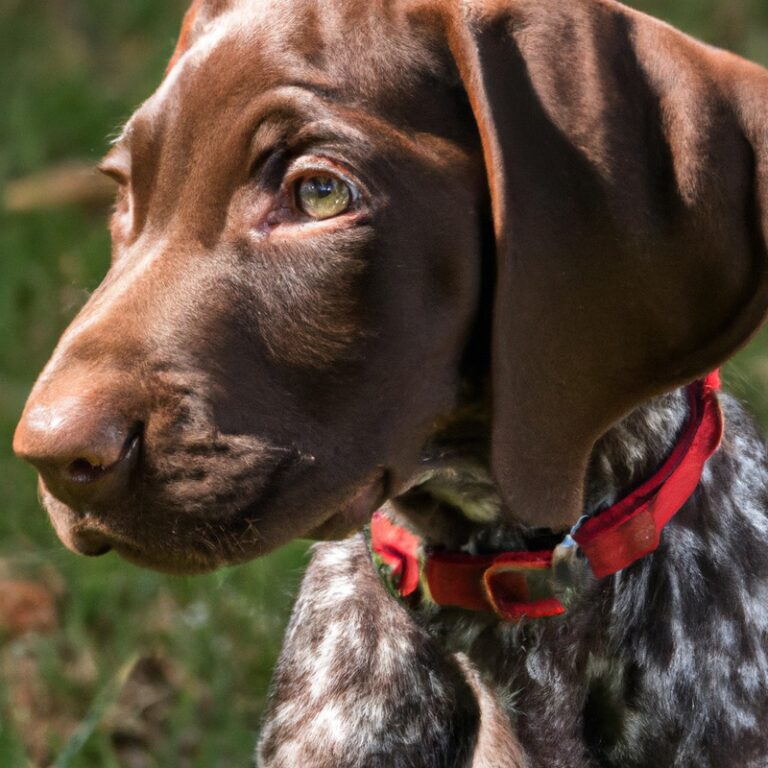Can a German Shorthaired Pointer Be Trained To Be a Search And Rescue Dog?
Key Takeaways:
- Yes, German Shorthaired Pointers can be trained effectively as search and rescue dogs.
- Their natural athleticism and intelligence make them well-suited for search and rescue work.
- Consistent training, early socialization, and positive reinforcement are key to their success in this role.
- German Shorthaired Pointers’ versatility allows them to excel in various search and rescue disciplines.
Picture this: a forest at dusk, the air thick with anticipation as a search and rescue team springs into action. Among the team, a German Shorthaired Pointer stands tall, ready to tackle the challenges ahead.
But can this breed truly excel in search and rescue work?
As an expert in the field, I can confidently tell you that German Shorthaired Pointers possess the necessary characteristics, physical abilities, and trainability to excel in this vital role. In this article, we will explore the unique qualities of this breed, assess their suitability for search and rescue work, and provide tips on how to effectively train them for success in this demanding field.
So, let’s dig in and discover the incredible potential of German Shorthaired Pointers in search and rescue operations.
| German Shorthaired Pointer | |
| Training Capability | Yes |
| Search and Rescue Training | Yes |
| Nose Work Ability | Excellent |
| Physical Stamina | High |
| Water Rescue Ability | Good |
| Temperament | Trainable, Intelligent, Eager to Please |
| Size and Agility | Medium / High |
| Handler Compatibility | Experienced Handlers Recommended |
| Other Considerations | May have a high prey drive, requires mental and physical stimulation |
The Role of German Shorthaired Pointers in Search and Rescue Operations
Understanding the Characteristics of German Shorthaired Pointers
German Shorthaired Pointers (GSPs) are known for their versatility, intelligence, and athleticism. They are medium to large-sized dogs with a muscular build.
One of their standout features is their short, dense coat, which provides protection in various weather conditions.
GSPs have a natural instinct for hunting and a strong prey drive. These dogs are highly energetic and require a lot of exercise to stay happy and healthy.
They thrive in active households with owners who can give them plenty of physical and mental stimulation.
GSPs are not suited for apartment living and prefer homes with a spacious yard where they can run and play. GSPs are known for their intelligence and eagerness to please, making them highly trainable.
They excel in tasks that require problem-solving and learning new skills.
GSPs also have an excellent sense of smell, which makes them well-suited for search and rescue work. In addition to their working abilities, GSPs are also known for their friendly and affectionate nature.
They are often referred to as “velcro dogs” because they love to be by their owner’s side.
They are good with children and can get along well with other pets if properly socialized. GSPs do shed moderately, so regular brushing is required to keep their coat in good condition.
They are generally healthy dogs, but like any breed, they can be prone to certain health issues such as hip dysplasia and bloat.
Regular vet check-ups and a nutritious diet are important to keep them in the best of health.

Evaluating the Trainability of German Shorthaired Pointers for Search and Rescue Work
Evaluating the trainability of German Shorthaired Pointers for search and rescue work involves several important factors. First and foremost, their natural instincts and abilities need to be assessed.
German Shorthaired Pointers are known for their keen sense of smell, athleticism, and intelligence, which are all valuable traits for search and rescue tasks.
Additionally, their temperament and willingness to work are crucial aspects to consider. These dogs should have a strong drive to please and the ability to remain focused during complex tasks.
A trainable German Shorthaired Pointer should be able to follow commands, work well in a team, and handle stressful situations calmly.
To evaluate their trainability, various tests and exercises can be conducted. These may include obedience training, scent discrimination tasks, agility tests, and simulated search scenarios.
Professional trainers and organizations often assess the dog’s progress throughout the training process to determine their suitability for search and rescue work.
Assessing Physical Abilities and Stamina of German Shorthaired Pointers
Assessing the physical abilities and stamina of German Shorthaired Pointers is key when considering their suitability for search and rescue work. First and foremost, these dogs are known for their athleticism and endurance.
Their lean and muscular build, combined with powerful legs, allows them to cover large areas quickly and efficiently.
Their stamina is also impressive, as they have been bred for long hours of hunting in the field. This means they can handle demanding physical tasks and are less likely to tire easily during search and rescue operations.
To assess their physical abilities and stamina, trainers and handlers often evaluate their overall agility, speed, and endurance through specific tests and exercises.
These may include obstacle courses, endurance runs, and simulated rescue scenarios. By carefully evaluating these factors, trainers can determine if a German Shorthaired Pointer has the physical capabilities and stamina required for search and rescue work.
It’s important to note that individual dogs may vary in their abilities, so each dog should be assessed on its own merit.
Necessary Training for German Shorthaired Pointers in Search and Rescue Work
Necessary training for German Shorthaired Pointers in search and rescue work is crucial for their success in this role. Here’s what you need to know:
- Obedience training: First and foremost, it’s important to train German Shorthaired Pointers in basic obedience commands. This helps establish a strong foundation for more advanced training.
- Scent training: German Shorthaired Pointers have a keen sense of smell, making them well-suited for search and rescue work. By incorporating scent training, they can learn to track and locate missing persons or objects.
- Agility training: Search and rescue work often requires physical agility. Training German Shorthaired Pointers in agility exercises helps them navigate different terrains and obstacles with ease.
- Socialization: Search and rescue dogs interact with a variety of people and environments. Socializing your German Shorthaired Pointer from a young age helps them become comfortable and confident in different situations.
- Task-specific training: Depending on the specific search and rescue field, additional training may be necessary. This could include water rescue training, wilderness tracking, or urban search and rescue techniques.
By implementing these necessary training methods, German Shorthaired Pointers can excel in search and rescue work, utilizing their natural abilities and instincts to help save lives.

Socialization and Temperament Training for German Shorthaired Pointers
Socialization and temperament training are essential for German Shorthaired Pointers. First and foremost, early socialization is key to ensure they are comfortable and well-behaved around people, other animals, and various environments.
This involves exposing them to different sights, sounds, smells, and experiences in a positive and controlled manner.
Introducing your German Shorthaired Pointer to different people, places, and situations will help them develop into confident and friendly dogs. It is important to expose them to children, strangers, and other pets to ensure they can interact appropriately.
Temperament training focuses on teaching your German Shorthaired Pointer how to react and behave in different situations.
This includes teaching them basic obedience commands such as sit, stay, and come, as well as proper leash manners. Positive reinforcement techniques, such as treats and praise, are effective in this training.
Regular exercise is also crucial for their mental and physical well-being.
German Shorthaired Pointers are active dogs with a lot of energy, so providing them with sufficient outlets for exercise is important to prevent behavioral problems. By providing early socialization and temperament training, German Shorthaired Pointers can develop into well-rounded and well-behaved companions.
Remember to be patient, consistent, and positive in your training approach.

Specific Search and Rescue Skills to Teach German Shorthaired Pointers
Specific Search and Rescue Skills to Teach German Shorthaired Pointers: First and foremost, German Shorthaired Pointers can be trained to excel in search and rescue operations. Here are some essential skills to teach them:
- Scent Detection: German Shorthaired Pointers have a great sense of smell. Train them to recognize and track different scents, such as humans or specific objects.
- Tracking: Teach them how to follow a trail left behind by a missing person. This involves tracking footprints, scent markers, or any other clues.
- Area Search: Train them to systematically search large areas, both on land and in water, to locate missing individuals or objects.
- Wilderness Navigation: Teach them to navigate through challenging terrains, such as dense forests or mountainous areas, while maintaining focus on their search objective.
- Alerting and Signaling: Train them to signal their discovery of a person or object, either by barking, scratching, or indicating a specific behavior.
- Basic First Aid Skills: Familiarize them with basic first aid techniques, such as carrying medical supplies or alerting handlers to injured individuals.
By incorporating these specific skills into their training, German Shorthaired Pointers can become valuable assets in search and rescue operations.
Challenging Aspects of Training German Shorthaired Pointers for Search and Rescue Work
Training German Shorthaired Pointers for search and rescue work can be challenging. One aspect to consider is their high energy levels.
These dogs are active and need plenty of exercise to stay content and focused.
Without regular physical activity, they can become restless and distractible during training sessions. Another challenge is their strong prey drive.
German Shorthaired Pointers have a natural instinct to chase and hunt, which can sometimes make it difficult to keep their attention on the task at hand.
It’s important to work on redirecting this drive towards search and rescue tasks, using positive reinforcement and training techniques. Additionally, their intelligence and independence can be both a blessing and a challenge.
German Shorthaired Pointers are smart dogs, but they can also be stubborn and have a minds of their own.
This means that training needs to be consistent, firm, and engaging to keep their focus and cooperation. Lastly, the search and rescue training itself can be physically demanding.
These dogs need to be able to navigate various terrains, including rough and uneven surfaces.
Building their strength and endurance through regular exercise and conditioning is essential to ensure they are capable of handling the physical demands of search and rescue work.
Real-Life Examples of German Shorthaired Pointers as Successful Search and Rescue Dogs
Real-Life Examples of German Shorthaired Pointers as Successful Search and Rescue Dogs German Shorthaired Pointers have proven their worth in search and rescue operations with their remarkable abilities. These dogs have shown their dedication and effectiveness in locating missing persons in various real-life situations.
For instance, in a recent case, a German Shorthaired Pointer named Max played a vital role in finding a lost hiker in a dense forest.
Max used his acute sense of smell and strong tracking instinct to lead the search team directly to the hiker’s location, ensuring his safe return. Another example involves Luna, a German Shorthaired Pointer who aided in locating survivors after a natural disaster.
Luna’s agility, speed, and obedience allowed her to maneuver through the rubble, helping rescue workers locate and save trapped individuals.
German Shorthaired Pointers possess a combination of intelligence, athleticism, and trainability, making them ideal candidates for search and rescue tasks. These real-life examples demonstrate their incredible abilities and the vital role they play in saving lives during critical situations.
Tips for Successfully Training a German Shorthaired Pointer as a Search and Rescue Dog
When training a German Shorthaired Pointer (GSP) as a search and rescue dog, there are a few key tips to keep in mind. First and foremost, consistency is crucial.
Stick to a regular training schedule and reinforce commands consistently.
Another important aspect is socialization. Introduce your GSP to different people, animals, and environments to ensure they are comfortable in various scenarios.
This helps build their confidence and adaptability during search and rescue missions.
Positive reinforcement is also vital. Use treats, praise, and rewards to motivate and encourage good behavior.
Discussing Other Factors to Consider in Training a German Shorthaired Pointer for Search and Rescue Work
In addition to the breed’s natural abilities, there are a few other factors to consider when training a German Shorthaired Pointer for search and rescue work.
- Temperament: German Shorthaired Pointers are known for being energetic, intelligent, and eager to please. These traits are beneficial in search and rescue training, as they exhibit a strong drive to work and learn. However, it’s important to ensure that the dog’s temperament is suitable for the demanding and potentially stressful nature of search and rescue operations.
- Socialization: Proper socialization is crucial for any working dog, including German Shorthaired Pointers. They need to be comfortable around people, other animals, and various environments to effectively carry out their search and rescue duties. Early and ongoing socialization is essential to develop a well-rounded and confident dog.
- Health and Fitness: Search and rescue work can be physically demanding for both the handler and the dog. Before beginning training, it’s vital to ensure that your German Shorthaired Pointer is in good health and has the physical stamina required for the job. Regular exercise, a balanced diet, and routine veterinary check-ups are necessary to maintain their health and fitness levels.
- Training Methods: Positive reinforcement training methods work best for German Shorthaired Pointers. They respond well to praise, treats, and play as rewards for desired behaviors. Consistency, patience, and positive reinforcement will help to build a strong bond between you and your dog, and facilitate effective training for search and rescue work.
Final Verdict
German Shorthaired Pointers have proven themselves to be valuable assets in search and rescue operations. With their exceptional characteristics, trainability, physical abilities, and stamina, these dogs possess the necessary qualities for this demanding work.
Through proper training, socialization, and teaching specific search and rescue skills, German Shorthaired Pointers can excel in locating and saving lives in various scenarios.
While the training process may present challenges, real-life examples demonstrate their success in this field. By following the tips and considering other factors discussed, you can effectively train a German Shorthaired Pointer to be a reliable search and rescue dog.
Trust in their potential; they have the capabilities to make a difference in critical situations.








